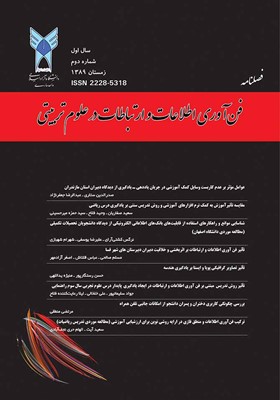تأثیر روش تدریس مبتنی بر فن آوری اطلاعات و ارتباطات در ایجاد یادگیری پایدار درس علوم تجربی سال سوم راهنمایی
محورهای موضوعی : فن‎آوری اطلاعاتجواد سلیمانپور 1 * , علی خلخالی 2 , لیلا رعایت کننده فلاح 3
1 -
2 -
3 -
کلید واژه: فن آوری اطلاعات و ارتباطات, روش تدریس, یادگیری پایدار, علوم تجربی,
چکیده مقاله :
پژوهش حاضر مطالعه ای شبه تجربی است که با هدف تعیین تأثیر روش تدریس مبتنی بر فنآوری اطلاعات و ارتباطات در ایجاد یادگیری پایدار درس علوم تجربی دانشآموزان پایه ی سوم راهنمایی شهرستان رامسر در سال 1389 انجام شد. جامعه ی آماری تحقیق شامل کلیه ی دانشآموزان دختر سال سوم راهنمایی شهرستان مذکور به تعداد 395 نفر بود. با توجه به نمونه های آماری در دسترس و جایگزینی آنها در دو گروه آزمایش و خطا، نمونه گیری تصادفی به تعداد 50 نفر صورت پذیرفت. به منظور بررسی اثر بخشی مقایسه ای روش تدریس مبتنی بر ICT و تدریس سنتی در یادگیری پایدار دانشآموزان، آزمون مجدد در دو مرحله به عمل آمد. مرحله ی اول یک ماه پس از اجرای اولیه و مرحله ی دوم سه ماه پس از آن انجام گرفت. جهت اجرای تدریس مبتنی بر فنآوری اطلاعات و ارتباطات آرایش کلاسی به صورت گروه های دو نفره شکل گرفت و هر گروه یک رایانه در اختیار داشت که به صورت شبکه با همدیگر و با رایانه اصلی یعنی دبیر مربوطه در ارتباط بودند. برای کنترل کاربرها و مدیریت کلاس از نرمافزار نت ساپورت اسکول استفاده گردید و موضوعات درسی از سه طریق ارائه گردید: الف) محتوای الکترونیکی تولید شده توسط دبیر ب) اتصال به شبکه اینترنت ج)کاربرد نرمافزارهای آموزشی. تجزیه و تحلیل دادههای حاصله با نرمافزارSPSS انجام شد و روش آماری آزمون t دوگروه مستقل بود.نتایج حاصل از تحقیق، تأثیر روش تدریس مبتنی بر فنآوری اطلاعات و ارتباطات بر یادگیری پایدار دانشآموزان دردرس علوم تجربی را تأیید نمود. همچنین مشخص شد که میزان یادگیری پایدار در روش تدریس مبتنی بر فنآوری اطلاعات و ارتباطات بیشتر از روش تدریس سنتی است.
The present research is a quasi–experimental one with the aim of determining the effect of information and communication technology- based (ICT-based) teaching method in creating sustained learning in experimental science course of third grade secondary school students in Ramsar in 2010. The statistical population included all the third grade secondary school female students about 395 people. Considering the statistical samples available, 50 subjects were selected and divided into experimental and control groups based on random sampling method. To evaluate the comparative effectiveness of ICT-based teaching method and traditional one on students’ sustained learning, a retest was administered in two phases. The first phase was done one month after the initial administration, and the second one was done after three months. To perform ICT-based teaching methods, classes were arranged with two students, each class was given a computer which was connected to the others and to the main computer (that of the teacher) in a network. To control the users and for the purpose of class management," Net School Support" software was used and the subject matters were presented in three different ways: a) electronic content produced by the teacher, b) connection to internet, and c) the use of educational software's. Analysis of the obtained data was done with SPSS software, and the statistical method used t test two independent groups. The results of the research confirmed the effect of ICT-based teaching method in creating sustained learning in experimental sciences course in third grade secondary school students. Therefore, based on tests performed and the obtained results, the rate of sustained learning through ICT- based methods was more than the traditional methods.

